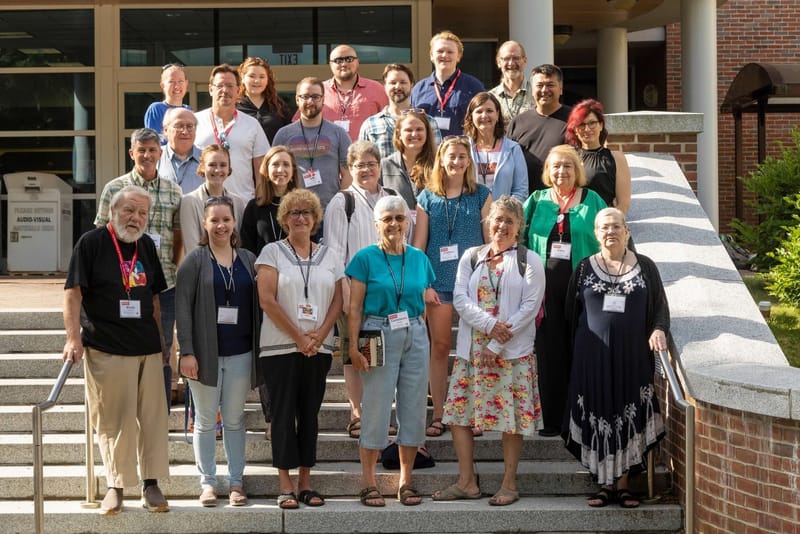Professional Development Workshops

Teaching the Holocaust & Genocide: Remembrance, Education, Building Resiliency
Genocide is an extraordinary event, but the product of ordinary human behavior. How and why must we confront the past? This workshop provides guiding thoughts to navigate difficult issues utilizing frameworks for civic education that promotes competencies for democratic citizenship. What should we teach and how should we teach it? The methodological considerations we explore can be applied to any social studies or English curriculum. We will examine process, choice, and prevention. We will explore the pedagogical and contemporary challenges and considerations facing today’s classroom teacher. How do we confront the past to build resiliency, create safe spaces, while paying attention to escalating violence towards an “other”?
The Camera as Weapon: Deconstructing Nazi Imagery for Media Competency
Photojournalism, not just print journalism, became a respected arbiter of “fact” with the liberation of the camps. Do photos still have the same impact and what are potential pitfalls in using them? Photographs do not merely capture or illustrate the historical past, they interpret it. How do we construct and deconstruct narratives? A potential pitfall in teaching about the Holocaust is using Holocaust imagery without ever teaching students how to evaluate and decode those images. Nazi photographers were designated as “weapons” of the Nazi effort and their images continue to have power to shape the narrative in ways that serve the perpetrator. We must recognize that the photographs are part of the process of genocide. We must critically evaluate this evidence as much as we do written or oral material. This workshop uses a series of competency expectations such as: recognizing perspective; intentionally; social, political context; elements of composition; expanding the frame; and asking, who took the photograph and why? Applying these competencies today will help students interpret propaganda, discuss historical comparisons and contrasts, and develop media literacy. Students will be able to deconstruct imagery while developing a sense of the “moral universe” perpetrators operate in.
Teaching Anne Frank: To Be Free, to Be Myself
Who was Anne Frank and why are we focused on her tragedy? This presentation raises questions about how we think about and remember Anne and why. Do we see her story as one of triumph and affirmation or a challenge? Anne’s Jewish identity was initially hidden when the diary was published. Why did her identity as a Jew need to be hidden again? Anne’s diary is useful in helping students grow from self-focus to thinking of others. Student journals can be guided to be about others and Anne’s diary can be utilized to show Anne’s growing maturity, awareness of others (not just herself) and her growing introspection in the midst of building pressure. How does Anne's voice, shifting into an awareness of others, become, as she hoped, "useful" as we face the challenges of today? How do we resist evil while maintaining our moral core? How do we challenge students to let others be who they choose to be? Drawing on the diary and Anne's experiences we will challenge our own prejudices and ask difficult questions of ourselves. The life and decisions of the Frank family (such as emigration and going into hiding) are placed within the context of the Nazi era. Otto Frank’s failed attempt to get his two children (Margot and Anne) into the United States begins a discussion of U.S. immigration policy and the villainization of immigrants and refugees. This presentation also traces the fate of those hiding in the Secret Annex. How can we draw on the example of the rescuers and of the Franks themselves to honor Anne's April 1944 wish, "If only I can be myself"?
Teaching Elie Wiesel: Trauma, Remembrance, and Hope
How does one approach Elie Wiesel's work and witness in the classroom? This workshop presents Night as a constructed memoir, a crafted testimony; a matzeva (marker/gravestone) about the limits of witnessing and “surviving survival”. How do the white spaces add to the silence and to the content? We will discuss Night as the beginning, not end, of Wiesel’s reencounter with the Shoah by exploring the text through his Hasidic roots and identity. By studying the Shoah and Wiesel’s writings we will encounter his hope that the spark for goodness must be ignited within us. How does Night help us to “hold” someone else’s traumatic memory? How will reading this book make me a better person? How will Night allow us “to fence with the shadows, but always have the song”? This workshop looks at the construction of Night; the questions it raises; its Hasidic framework; and how to teach it as the beginning of a journey against despair and towards resiliency.
NH’s Holocaust and Genocide Education Mandate: Building Resiliency Through Education
Recognizing that hate, bigotry, and antisemitism are toxic for democracies NH requires social studies classes (beginning Fall of 2022) to utilize existing curricula to implement Holocaust and genocide education. What is this requirement exactly and what are some best practices and frameworks to help meet the minimum standards? This session will define crimes of mass atrocity (war crimes, crimes against humanity, genocide); explore guidelines; discuss how to compare and contrast mass atrocity; present available resources; opportunities for professional growth; discuss lesson planning and rationales; utilize competencies for democratic citizenship; and explore ways education can enhance civic responsibility and democratic values.